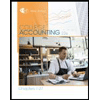
Financial Accounting
3rd Edition
ISBN: 9780078025549
Author: J. David Spiceland, Wayne M Thomas, Don Herrmann
Publisher: McGraw-Hill Education
expand_more
expand_more
format_list_bulleted
Question
Chapter 12, Problem 6RQ
To determine
To explain: why ratios that compare an income statement account with a
Expert Solution & Answer
Want to see the full answer?
Check out a sample textbook solution
Students have asked these similar questions
Austin Company uses a job order cost accounting system. The company's executives estimated that direct labor would be $8,400,000 (840,000 hours at $10/hour) and that factory overhead would be $5,400,000 for the current period. At the end of the period, the records show that there had been 300,000 hours of direct labor and $5,100,000 of actual overhead costs. Using direct labor hours as a base, what was the predetermined overhead allocation rate?
Subject:-- provide correct answer general accounting
Accounting
Chapter 12 Solutions
Financial Accounting
Ch. 12 - Prob. 1RQCh. 12 - Prob. 2RQCh. 12 - Prob. 3RQCh. 12 - Prob. 4RQCh. 12 - 5.In performing horizontal analysis, why is it...Ch. 12 - Prob. 6RQCh. 12 - Prob. 7RQCh. 12 - Prob. 8RQCh. 12 - Prob. 9RQCh. 12 - Prob. 10RQ
Ch. 12 - Prob. 11RQCh. 12 - Prob. 12RQCh. 12 - Prob. 13RQCh. 12 - Prob. 14RQCh. 12 - Prob. 15RQCh. 12 - Prob. 16RQCh. 12 - Prob. 17RQCh. 12 - Prob. 18RQCh. 12 - Prob. 19RQCh. 12 - Prob. 20RQCh. 12 - Prob. 12.1BECh. 12 - Prob. 12.2BECh. 12 - Prob. 12.3BECh. 12 - Prob. 12.4BECh. 12 - Prob. 12.5BECh. 12 - Universal Sports Supply began the year with an...Ch. 12 - Prob. 12.7BECh. 12 - Prob. 12.8BECh. 12 - Prob. 12.9BECh. 12 - Prob. 12.10BECh. 12 - Prob. 12.11BECh. 12 - Prob. 12.12BECh. 12 - Prob. 12.13BECh. 12 - Classify each of the following accounting...Ch. 12 - Classify each of the following accepted accounting...Ch. 12 - Prob. 12.1ECh. 12 - Prob. 12.2ECh. 12 - Prob. 12.3ECh. 12 - Prob. 12.4ECh. 12 - Prob. 12.5ECh. 12 - Prob. 12.6ECh. 12 - Prob. 12.7ECh. 12 - Prob. 12.8ECh. 12 - Prob. 12.9ECh. 12 - The income statement for Stretch-Tape Corporation...Ch. 12 - Prob. 12.11ECh. 12 - Prob. 12.12ECh. 12 - Prob. 12.13ECh. 12 - Prob. 12.14ECh. 12 - Distinguish between conservative and aggressive...Ch. 12 - Prob. 12.1APCh. 12 - Prob. 12.2APCh. 12 - Prob. 12.3APCh. 12 - Prob. 12.4APCh. 12 - Prob. 12.5APCh. 12 - Prob. 12.6APCh. 12 - Prob. 12.1BPCh. 12 - Prob. 12.2BPCh. 12 - Prob. 12.3BPCh. 12 - Prob. 12.4BPCh. 12 - Prob. 12.5BPCh. 12 - Prob. 12.6BPCh. 12 - Prob. 12.1APCPCh. 12 - Prob. 12.2APFACh. 12 - Prob. 12.3APFACh. 12 - Prob. 12.4APCACh. 12 - Prob. 12.5APECh. 12 - Prob. 12.7APWCCh. 12 - Prob. 12.8APEM
Knowledge Booster
Similar questions
- Everlast Corp. has total maintenance department expenses of $40,200. The maintenance costs are allocated based on square footage, where the Processing department occupies 6,000 square feet, and the Packaging department occupies 3,000 square feet. Compute the amount of maintenance department expense allocated to Processing.arrow_forwardDon't use ai given answer general accounting questionarrow_forwardDetermine a and b accountingarrow_forward
- At the high level of activity in November, 10,300 machine hours were run and power costs were $20,600. In April, a month of low activity, 3,800 machine hours were run and power costs amounted to $8,000. Using the high-low method, the estimated fixed cost element of power costs is __. ???arrow_forwardWhat is the adjusted book balance of this financial accounting question?arrow_forwardPlease see an attachment for details general accounting questionarrow_forward
- Can you help me with general accounting questionarrow_forwardOrion Enterprises data for the year 2019 is presented below: • Credit sales during the year: $5,200,000 • Accounts receivable - December 31, 2019: $480,000 • Allowance for bad debts - December 31, 2019: $40,000 ⚫ Bad debt expense for the year: $25,000 What amount will Orion Enterprises report on its year-end balance sheet for the net realizable value of its accounts receivable? A. $445,000 B. $440,000 C. $480,000 D. $460,000arrow_forwardhow much revenue should be recognized?arrow_forward
arrow_back_ios
SEE MORE QUESTIONS
arrow_forward_ios
Recommended textbooks for you
 College Accounting, Chapters 1-27 (New in Account...AccountingISBN:9781305666160Author:James A. Heintz, Robert W. ParryPublisher:Cengage LearningPrinciples of Accounting Volume 1AccountingISBN:9781947172685Author:OpenStaxPublisher:OpenStax College
College Accounting, Chapters 1-27 (New in Account...AccountingISBN:9781305666160Author:James A. Heintz, Robert W. ParryPublisher:Cengage LearningPrinciples of Accounting Volume 1AccountingISBN:9781947172685Author:OpenStaxPublisher:OpenStax College Intermediate Accounting: Reporting And AnalysisAccountingISBN:9781337788281Author:James M. Wahlen, Jefferson P. Jones, Donald PagachPublisher:Cengage Learning
Intermediate Accounting: Reporting And AnalysisAccountingISBN:9781337788281Author:James M. Wahlen, Jefferson P. Jones, Donald PagachPublisher:Cengage Learning College Accounting (Book Only): A Career ApproachAccountingISBN:9781337280570Author:Scott, Cathy J.Publisher:South-Western College Pub
College Accounting (Book Only): A Career ApproachAccountingISBN:9781337280570Author:Scott, Cathy J.Publisher:South-Western College Pub

College Accounting, Chapters 1-27 (New in Account...
Accounting
ISBN:9781305666160
Author:James A. Heintz, Robert W. Parry
Publisher:Cengage Learning

Principles of Accounting Volume 1
Accounting
ISBN:9781947172685
Author:OpenStax
Publisher:OpenStax College

Intermediate Accounting: Reporting And Analysis
Accounting
ISBN:9781337788281
Author:James M. Wahlen, Jefferson P. Jones, Donald Pagach
Publisher:Cengage Learning

College Accounting (Book Only): A Career Approach
Accounting
ISBN:9781337280570
Author:Scott, Cathy J.
Publisher:South-Western College Pub